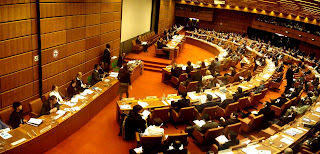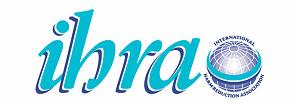 This afternoon, during the second day of the 51st session of the Commission on Narcotic Drugs, IHRA's Senior Policy Advisor, Rick Lines (at bottom left of the photo-click on image to get full size) addressed delegates during a plenary debate on demand reduction.
This afternoon, during the second day of the 51st session of the Commission on Narcotic Drugs, IHRA's Senior Policy Advisor, Rick Lines (at bottom left of the photo-click on image to get full size) addressed delegates during a plenary debate on demand reduction.
A copy of IHRA's statement is below.
"Each December, the UN General Assembly adopts a resolution entitled 'International cooperation against the world drug problem'. This resolution states that drug control activities must be 'carried out in full conformity with the purposes and principles of the Charter of the United Nations and…with full respect for…all human rights and fundamental freedoms'.
This resolution of the UN’s highest policy-setting body directs CND to prioritise human rights. Yet to date, mention of human rights has been almost completely absent from CND’s work. In effect, CND has failed in its obligation to take direction from the General Assembly.
This year agencies across the UN system celebrate the 60th anniversary of the Universal Declaration of Human Rights. And in this year we see hope for change.
We welcome Mr. Costa’s comments yesterday on the need to promote human rights in drug control activities, including the need to end the death penalty for drug offences. We welcome the statement in INCB’s most recent Annual Report that 'Due respect for universal human rights…is important' and that 'Non-respect…can undermine the conventions.'
Such words are important. But words are not enough. True leadership comes only when words are turned into action. We need action from CND to ensure that international human rights law is placed at the heart of its work.
What does human rights leadership from CND mean?
Human rights leadership means taking action to promote the right to health. For example, last year the UN Special Rapporteur on the Right to Health affirmed that the provision of harm reduction programmes is a necessary part of State obligations to fulfill the right to health. In this context, human rights leadership means that CND must robustly and unambiguously support harm reduction measures such as syringe exchange, opioid substitution treatment and safe injecting rooms, among other interventions. It also means ensuring that drug treatment programmes are voluntary and not coercive. It means that statements from drug control bodies like INCB are based on evidence and human rights obligations, and that affirmative action is taken to correct misinformation.
Leadership also means taking action to prevent human rights abuses in the name of drug control before they occur, and speaking out when there is legitimate fear of imminent human rights violations.
For example, in recent weeks, there have been indications from the Royal Thai government that it plans to resume its 'war on drugs'. It is important that UN agencies and Member States seek clarification of the government’s intentions in this regard. However, recent public comments by a government Minister have raised fears among many that the State intends to relaunch the campaign of extrajudicial killings seen in 2003, in which over 2,800 people were killed. This campaign was criticised by the UN Human Rights Committee, among other human rights monitors. Leadership on human rights means that CND and Member States must speak out clearly against abusive 'drug-control' policies wherever they occur.
Leadership on human rights means ensuring that UN-sponsored drug control activities have the promotion of human rights as key performance indicator, one fully integrated into programme planning and evaluation. We enjoin CND to ensure that UN drug control agencies undertake human rights impact assessments of all activities prior to their approval and implementation, as well as during and after the approved activities have begun. Only through such a process of assessment and monitoring can we be certain that UN-sponsored drug enforcement programmes do not result in human rights violations, and that they effectively promote the respect and fulfillment of human rights and the rule of law that is central to the UN’s mission.
Finally, leadership on human rights means using the democratic majority voting mechanism provided for CND under ECOSOC in cases where consensus is not possible on human rights issues, and ending the current status quo where a small handful of Member States are allowed to block human rights language in CND resolutions. This status quo undermines the promotion and protection human rights, a mission fundamental to the object and purpose of the UN. When consensus is not achievable, CND Members must vote and let the world see which States are willing to stand up to support human rights, and which are not.
In this 60th anniversary year of the Universal Declaration of Human Rights, we can no longer allow the 'spirit of Vienna' to undermine the spirit of the Declaration."
Thanks to Steve Rolles at Transform Drug Policy Foundation for the photo.
Tuesday, 11 March 2008
CND day 2 - IHRA statement on human rights and harm reduction during plenary debate on demand reduction
Labels: civil society, death penalty, human rights, human rights law, INCB, right to health, United Nations
Subscribe to: Post Comments (Atom)



0 comments:
Post a Comment